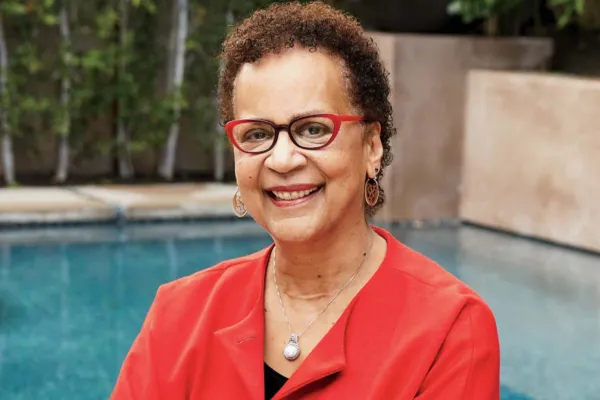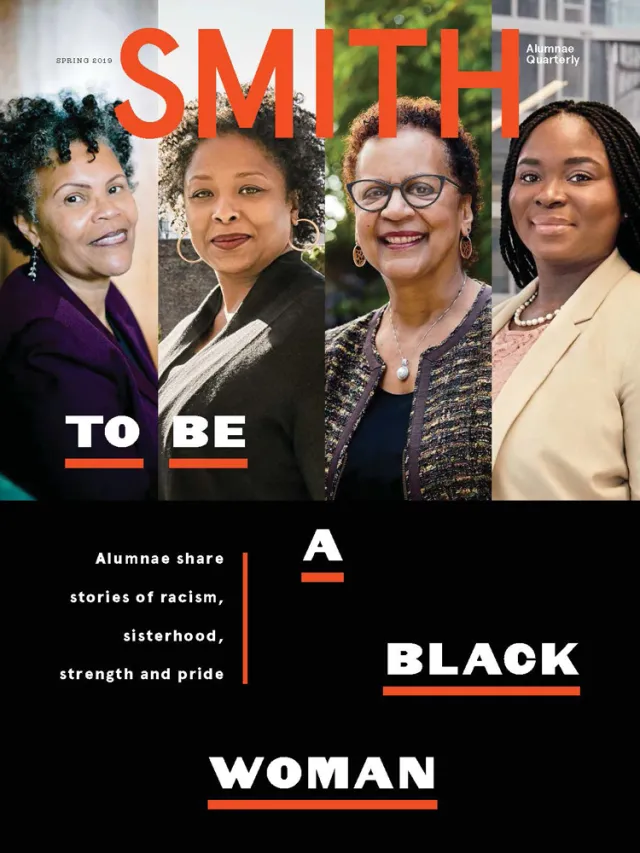‘If We Listen To How Others Define Us, We Remain Stuck’
Alum News

Published March 13, 2019
Sandra Williams ’75 is a senior vice president at CBS Television in Los Angeles, where she serves as deputy general counsel. In a conversation with journalist April Simpson ’06, she talks about the inner strength she developed as she navigated law school and her legal career.
As a black woman, how did you learn to navigate predominantly male and white law school environments in the 1970s?
It helped that there were other black women there. It was a difficult environment for all of us, and so to the extent that we could get together and share our frustrations, and how freaked out we were about being there, was really helpful. Law school was hard. There were times when I did not think I was going to make it. At times, I wasn’t sure I wanted to. Then, at one point—I can’t attribute it to anything in particular—I just decided, you know what, I’m going to do this.
A lot of women in my era, and some of those that came before, were used to being pioneers. We were used to being the first wave of black students in our high schools, in college. So, I developed over those years this sense of responsibility that I don’t do this just for me. I do this for my family. I do this for my community. I do this for my race.
Were there any incidents in law school where someone, such as a teacher or a peer, expected less of you or discriminated against you because you’re a black woman?
I remember feeling uncomfortable in classes when we were discussing the Bakke case, which was an affirmative action case that was pending before the Supreme Court at the time. It was very hard for me to have a dispassionate intellectual discussion about affirmative action, first of all, because I felt very strongly about it, and secondly, because implicit in the comments of students that were criticizing affirmative action was that I and other black students perhaps didn’t deserve to be there. That was tough. It was also good training as a lawyer to be in a situation where you’re tempted to respond emotionally, but remembering that you have to come up with cogent legal arguments. You’ve got to be able to keep your emotions in check to be able to argue and defend your position.
There are many recent instances of black women and girls being disrespected, such as the way the president and members of his administration have criticized Rep. Maxine Waters’ appearance and that of black women journalists. Do you worry about younger generations of black women and girls coming up in this environment?
It’s incredibly depressing at times because these are battles that we fought and I thought we’d won already. It requires that those of us who are a little bit older remind the young folks of something that my grandparents and my parents used to say: "It’s not what they call you, it’s what you answer to." That’s always been a guiding force for me; it’s more important that I know who I am and I won’t be limited by how others define me. As black people, we have always had to rely on our inner strength. We’ve always had to look to those older folks to tell us that we could be great, that we could achieve what we wanted in life and that we couldn’t let anybody turn us around. So, I think that is called for even more now. We certainly can’t allow our president to define us, nor can we allow anybody else who would tell us that we are less than fully capable of demonstrating excellence, brilliance and beauty. Anything less than that is just not the truth of who we are.
This story appears in the Spring 2019 issue of the Smith Alumnae Quarterly.

To Be a Black Woman: Alumnae Share Stories of Racism, Sisterhood, Strength and Pride
Deborah Archer ’93, “I’ve Picked a Lane. It’s Racial Justice.”
Billy Dean Thomas ’14, “I Felt Like I Was Being Tokenized”
Caroline Clark ’85, “I Am Not Black or a Woman. I’m a Black Woman”
Charlise Lyles ’81, “Who came to soothe my soul? All my Black sisters”
Lori Tharps ’94, “I Yearned for a Comfort and Confidence in My Blackness”
Deanna Dixon ’88, “I’m Proud That Our Students Hold Us Accountable”
Joyce Young ’75, “Challenging the Status Quo by Writing My Truth”
“What Excites You, Gives You Joy, Gives You Hope About Black Women in the World Right Now?
Sabine Jean ’11, “Am I the Only Black Person in Here?”
Vickie Shannon ’79, “Racism Is Their Problem—Not Yours”
Stephanie Mickle ’94, “Black Women Can Rally Voters, Influence Elections and Win”
Sandra Williams ’75 is senior vice president and deputy consul at CBS Television. Photograph by Amanda Friedman